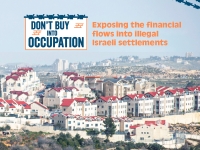Europe’s Banks Funnel Billions into Corporations Operating in the Occupied Palestinian Territories

Don't Buy Into Occupation report.
Billions of euros in bank loans and investments are flowing into companies operating in Israel’s settlements in the Occupied Palestinian Territories. They include construction contractors like HeidelbergCement and Volvo, travel operators like Airbnb, Booking, and Expedia, as well as military and surveillance contractors like Cisco, Elbit Systems and Motorola.
This is the conclusion of a new report from the Don’t Buy into Occupation (DBIO) coalition, a joint initiative of 25 European and Palestinian organizations, that cross-checked 112 companies listed in a United Nations database against banking data. The coalition includes groups like Banktrack, International Federation for Human Rights (FIDH), Norwegian People’s Aid (NPA), Institut Internacional per l’Acció Noviolenta (NOVACT) and Trócaire.
“The involvement of these corporations with the settlements – through investments, banking loans, resource extraction, infrastructure contracts and equipment and product supply agreements – provides them with the indispensable economic oxygen they require to grow and thrive," writes Michael S. Lynk, the United Nations Special Rapporteur on the situation of human rights in the Palestinian territories, in an introduction to the report.
The settlements
Amnesty International estimates that between 600,000 and 750,000 settlers live in over 250 illegal settlements in the Occupied Palestinian Territories (OPT). Some 130 of these are officially authorized by the Israeli government, while the other 120 are unofficial. They range in size from a few as 100 settlers to 37,000 in the town of Ma’ale Adumim. Most of these settlers live in the West Bank but about one third of the settlers live in East Jerusalem.
The data gathered by DBIO shows that over a period of 29 months – between January 2018 and May 2021 – 672 European financial institutions, ranging from banks and insurance companies to pension funds and asset managers, were involved in financing 50 enterprises that the researchers say preserve and expand Israel’s settlements. Altogether, these European institutions provided $114 billion in loans and underwriting to these 50 companies. Meanwhile, investors held $141 billion in the companies’ shares and bonds as of May 2021.
The settlements are in violation of the 1949 Fourth Geneva Convention and the 1998 Rome Statute. “The bottom line is that if you’re operating in settlements, you’re operating on stolen lands," Omar Shakir, Israel-Palestine director at Human Rights Watch, said at an online launch of the report.
Moreover, human rights experts have documented extensive human rights violations in the creation of these settlements for decades. For example, Al-Haq, an independent Palestinian human rights organization, recently uploaded a scanned version of a report published by the World Council of Churches in 1983 which compiles affidavits concerning “a range of violations to which Palestinians in the OPT are subjected, including demolition and sealing of houses; abuses by Israeli settlers; harassment of students; town arrests” and more.
Over the years, human rights organizations have published dozens of similar reports to little avail. As recently as October of this year, Israeli military forces were documented using live ammunition against settlement protestors near Beita and Beit Dajan in Nablus.
The investors
These reports of regular human rights violations have not deterred European investors. DBIO calculated that the top ten bought a total of $67.2 billion in shares and bonds in companies involved in the OPT, with Investor AB, based in Stockholm, Sweden, leading the pack with $10.6 billion. Groupe BPCE and Crédit Agricole, both based in France, invested $9 billion and $7.2 billion respectively. Deutsche Bank, based in Frankfurt, Germany, put in $6.4 billion, Allianz, based in Munich, Germany invested $5.1 billion while Legal & General, based in London, UK, put in $4.3 billion.
The top lender to the companies named in the report is France-based BNP Paribas, Europe’s largest bank, which made $17 billion in loans. They were followed by Deutsche Bank with $12 billion and HSBC and Barclays in the UK with $8.7 billion each. All told, European banks made a total of $77 billion in loans.
BNP Paribas, which accounted for 14 percent of total loans documented in the report, financed 33 out of the 50 corporations. Among those financed was Elbit Systems, one of Israel’s largest weapons companies – 19 percent of whose revenue in 2017 came from the Israeli Ministry of Defense.
Elbit’s surveillance drones are routinely deployed in the West Bank for military intelligence gathering. Human Rights Watch has documented the fact that Elbit drones were used in Israel’s 2009 Operation Cast Lead attack, which killed over 1,400 Palestinians. Elbit’s drones were also used extensively during Operation Protective Edge – the summer 2014 onslaught on Gaza in which over 500 Palestinian children were killed – according to research conducted by Who Profits, an independent research center.
Elbit Systems has so far not responded to any of the various allegations of its complicity in human rights and international law violations against Palestinians. However, a company human rights statement issued in May 2021, reads: “Elbit Systems is committed to respecting human rights … [ and recognizes] the importance of conducting business activities in a manner consistent with the United Nations Guiding Principles on Business and Human Rights.”
The DBIO report also tabulates the role of the top ten European lenders and investors in funding companies that take part in the routine demolition of Palestinian homes throughout the OPT by the Israeli government to clear the way for the creation of settlements. For example, a United Nations report documented that 421 Palestinian-owned buildings had been demolished in the first six months or so of 2021, displacing over 500 people.
DBIO cites Who Profits research to show that Volvo Group sells heavy machinery that is being used for the demolition of Palestinian houses in the occupied West Bank, the construction of Israeli settlements and military checkpoints, as well as the construction of the Separation Wall and Road 443, a West Bank road that is reserved for the use of Israeli settlers only.
BNP Paribas was Volvo Group’s largest lender during the 29-month period analyzed in the report, making $94 million in loans as well as another $1.27 billion in underwriting to the company. Next up was Sweden’s Skandinaviska Enskilda Banken with $1.35 billion in loans and underwriting, Finland’s Nordea with $1.29 billion and Germany’s Deutsche Bank with $1.27 billion. Volvo’s top European investors were Sweden’s AB Industrivärden and Alecta, who held company shares and bonds worth $4 billion and $1.88 billion, respectively.
In June 2018, Volvo Group responded to a query from the Business and Human Rights Resource Centre about allegations of complicity in human rights abuses in the OPT. “We do not believe that the sale of Volvo products to business partners in Israel can reasonably be seen as a breach of our commitments under the UN Global Compact,” a Volvo spokesperson wrote. “Volvo products have a long life span, may be leased/rented, and may change ownership several times. We are thus limited in our possibilities to influence how Volvo products are used throughout their entire life cycle.”
Another example analyzed in the DBIO report is the HeidelbergCement Group, a building materials multinational based in Heidelberg, Germany. In 2007, HeidelbergCement bought Hanson Israel, which owns several concrete plants and quarries in the occupied West Bank, including the Nahal Raba quarry in the West Bank village of Al-Zawiya, in Salfit.
The quarries supply stone and other building materials to the Israeli construction industry, including for the use of building settlements, as documented by groups like Human Rights Watch. Such mining operations which extract resources from occupied land, Al-Haq says, meet the definition of pillage, which is a war crime.
In 2009, Yesh Din, an Israeli human rights organization, sued to stop HeidelbergCement from mining in Nahal Raba, but lost in court. Ten years later, the Israeli government allowed the company to expand its activities.
The DBIO report found that, between 2018 and May 2021, European lenders such as Deutsche Bank, Danske Bank and Barclays made over $8 billion in loans to HeidelbergCement, while investors – including Deutsche Bank, Deka Group and Crédit Agricole – owned or managed HeidelbergCement shares and bonds worth over $1.8 billion as of May 2021.
In several company responses, HeidelbergCement has repeatedly denied allegations that it is violating international law in the OPT. “No private ownership [of the land] could be determined. Therefore no expropriation has taken place,” wrote Andreas Schaller, director of group communication for HeidelbergCement in a letter to the Business and Human Rights Resource Centre. “From HeidelbergCement’s perspective, the quarrying activity is compatible with international humanitarian law as it produces substantial advantages for the local Palestinian population and at the same time it hardly affects the raw material reserves.”
Other multinationals cited by the DBIO report included Cisco Systems, which has set up technology hubs across Israel as well as one in the occupied Syrian Golan, located at Ha’Emir junction, and another in the settlement regional council of Mateh Binyamin, occupied West Bank. Four more are planned – one in the Golan and three others in Modi’in Illit, Beitar Illit and the Shomron Regional Council in the West Bank.
Cisco Systems’ top European lender was Deutsche Bank, which made $659 million in loans, followed by Barclays ($480 million), BNP Paribas ($310 million) and HSBC ($245 million). The technology conglomerate’s top investors in Europe, according to the report, were Norway’s Government Pension Fund, which held shares and bonds worth $2 billion, followed by the Legal & General ($1.57 billion), Finland’s Nordea ($1.48 billion), France’s BPCE Group ($1.33 billion), and the UK’s Generation IM ($1.2 billion).
Who Profits research center invited Cisco Systems to comment on allegations of international law violations prior to publishing its report on the company in September 2019 but the company did not respond.
Motorola Solutions, the data communications and telecommunications multinational, sold a Wide Area Surveillance System (WASS) to the Israeli Ministry of Defense that includes radars and cameras to detect human movement outside the settlements. It has been installed in at least 25 settlements such as Beit Hagai, Bracha, Eli, Elon More, Hebron, Karmei Tzur, Kfar Tapuach, Mechora, Otniel, Rehelim, Shilo, Talmon and Tko’a, according to Who Profits. The WASS system is also used in the Separation Wall complex and on military bases.
Deutsche Bank led the pack of lenders once again, making $731 million in loans and underwriting services to Motorola. BNP Paribas and HSBC were right behind, providing $135 million each, followed by Santander ($123 million) and Lloyd’s Banking Group ($111 million). Crédit Agricole was the top investor, holding a total of $446 million in shares and bonds as of May 2021. Deutsche Bank was up next, with $371 million in investments, followed by the UK’s Janus Henderson with $362 million.
Motorola has also failed to reply to media queries about their operations in Palestine.
Tourism multinationals like Airbnb, Booking, and Expedia also benefit from the OPT by advertising multiple properties located in Israeli settlements, according to research by Amnesty International. Ironically, this means that tourists from around the world can rent rooms on occupied Palestinian lands while millions of Palestinians living in exile are denied the right to return to their homes.
Short-term rental agency Airbnb received $1.53 billion in European loans with the highest sum coming from Barclays ($861 million), followed by BNP Paribas ($451 million) and Deutsche Bank ($218 million). A total of $1.22 billion in Airbnb shares and bonds are held by European investors such as the UK’s Galileo ($574 million), BPCE Group ($215 million) and the UK’s Apoletto ($185 million).
In November 2018, Airbnb removed some 200 listings located in Israeli settlements in the occupied West Bank from its platform, but made it clear that it did not support a boycott of Israel. “Our announcement does not apply to more than 20,000 listings in Israel — including in Jerusalem and Golan Heights — and hosts continue to share their places with travelers,” the company stated in a press release posted on its website.
Just five months later, Airbnb reversed this decision after multiple lawsuits were brought against the company by Israeli hosts, but announced that it would donate all profits from Airbnb activity in the West Bank to humanitarian non-profits.
Booking Holdings (which operates the ticket site Booking.com) received a total of $2.17 billion in loans and underwriting services from European lenders, according to DBIO: Deutsche Bank took the lead with $982 million in loans, followed by BNP Paribas ($592 million) and HSBC ($317 million). Investors poured a total of $12.2 billion into Booking Holdings, with the top 3 being BPCE Group ($1.85 billion), Janus Henderson ($1.51 billion) and Crédit Agricole ($1.09 billion).
Unlike Airbnb, Booking has refused to change its policies. "Everything we do in terms of how we display information is always in accordance with local laws to provide transparency to anybody looking for accommodation on our site," the company said in a statement released to Agence France-Presse.
For Expedia Group, another ticketing and travel website, European lenders made $2.27 billion available in loans and underwriting: BNP Paribas and HSBC made $1.02 billion in loans each, followed by Standard Chartered ($231 million). A total of $2.1 billion in Expedia’s bonds and shares were held or managed by European investors, the top three being Allianz ($859 million), BPCE Group ($348 million), the UK’s Marshall Wace ($179 million).
Expedia has reacted cautiously to the issue of Palestine. In a response to an Amnesty International report on the settlement tourism industry, the company issued the following statement: “We are currently reviewing the transparency of our display not only in the Occupied Palestinian Territories, but as well as other disputed territories globally to ensure that travelers have the information necessary to make the travel decisions that best suit their needs.”
Reception of the report
The DBIO report has been welcomed by a major Norwegian pension fund (Kommunal Landspensjonskasse Gjensidig Forsikringsselskap or KLP), which has over $95 billion in assets and has already divested from 16 companies operating in the OPT. “I would say this is an important tool because we would like to be invested in the companies but we want to make sure that the companies have a responsible approach to their business and how they are mitigating the risks,” Kiran Aziz, a senior analyst at KLP, said at the online launch of the report.
The report was also welcomed by Palestinian activists. “[If] companies and financial institutions don’t stop their complicity in crimes against Palestinian population, we expect European citizens to put more pressure on these institutions,” Naim Abed Muhammad Shouqair, former mayor of Al-Zawiya town in the West Bank, said at the same event. “We expect solidarity.”
While Israel has not responded to the DBIO report, it has reacted angrily to the 2020 United Nations list of companies involved in the OPT, and to divestment announcements such as those made by KLP. “We will contest this [blacklist] with all of our strength,” Prime Minister Benjamin Netanyahu told Israeli Army Radio at the time. “We will gain recognition for our sovereignty over these communities and this will cancel its effect.”



